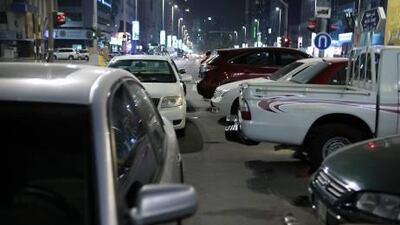ABU DHABI //More than a month after the municipality announced a plan to impound illegally parked cars, residents in parts of the city say they have yet to see the plan enforced.
On June 1, the capital's Department of Transport said it would, effective immediately, begin towing all vehicles parked illegally in spots that were part of Mawaqif, the capital's paid parking programme.
MORE UAE NEWS: Our pick of today's top local news stories
UAE expats shed tears of joy as South Sudan is born Dubai is some 2,300 kilometres from Juba - but for South Sudanese expatriates in the Emirates, yesterday was an occasion to feel close to their country. Read article
Restaurants' charges for water 'wrong and illegal' Consumers urged to report outlets that charge more than double the supermarket price for local bottled water as mark-ups of more than 2,000 per cent are discovered. Read article
Woman sues father so she can marry An Emirati woman is suing her father because he has not given her permission to marry her would-be husband. Read article
Residents say that is not happeneing, and that in some cases the drivers are not even being fined.
One problem area is at the corner of Airport Road and Corniche Street, where recently more than 300 vehicles were parked illegally. In certain cases, motorists created a middle parking lane in a paid parking zone, blocking access to legal spaces.
Mohammed Akhtar, from Pakistan, and Raj Jhajharia, from India, described their feelings towards Mawaqif as a "love/hate relationship".
The two Adnoc employees said that while the parking scheme might have improved the situation in other areas, that was not the case in their part of town.
"It's extremely frustrating," Mr Akhtar said. "At least before, you could park anywhere and not have to worry about the zone you're parking in or getting fined. After Mawaqif, parking became impossible."
Mr Akhtar said residents in the area launched a series of complaints, to which he said Mawaqif had yet to respond.
"They couldn't provide a solution, so they decided to close their eyes to the problem," Mr Akhtar asserted.
Residents say there are regularly no Mawaqif inspectors in the area. Illegally parked vehicles are neither fined nor towed. Drivers can be seen trying to manoeuvre through a maze of vehicles, which residents said blocks access and turns two-way streets into a one-way nightmare.
Residents from other areas have recognised that parking in the area has become a free for all, adding to the chaos, Mr Akhtar said.
Mr Jhajharia, who holds a resident permit, finds himself in a predicament.
"When I come home at 2am, the parking is full and I'm on an endless search," he said. "Now you tell me, where am I supposed to park the car?"
Residents repeatedly said they were willing to pay the price for parking, provided they reaped the benefit.
"Even if it was double the amount, we wouldn't mind, as long as we knew we were getting a parking spot," Mr Jhajharia said. "But first you provide sufficient parking spots, then you charge. Not the other way around."
Mohammed Abdullah, a Palestinian marketing executive who parks legally in what is meant to be a resident-only parking lot, said making a phone call to the police is part of his daily routine.
"It's an additional half an hour to my morning," he said. "Sometimes the police have to call the car owner to come move it, other times I have to wait for the police to arrive so they can tow the car."
By the end of last year, there were approximately 30,000 Mawaqif parking spots across 19 areas in Abu Dhabi city. In the first five months of this year, Mawaqif added more than 10,000 spaces across five additional areas.
Short-term goals by the Department of Transport, Mawaqif's governing body, include having a total of 71,000 parking spots under its scheme by the end of the year and the development of 10 multi-storey car parks.
However, as the number of paid parking spots increases, not all residents are having bad experiences. In Khalidiya, where illegally parked vehicles once covered the pavement and rubbish bins took up two or three spots at a time, the parking situation seems to be improving.
Ahmad Higaz, a public relations executive from Egypt who lives in the area, said the paid parking has been effective.
"Things have cleared up. You don't see as many cars piled on top of each other," he said. "They are not showing any mercy to the people who park here. People are getting fined immediately."
In April, Mawaqif added 1,650 paid parking spots in Khalidiya, including a 38,400 square-metre carpark that can accommodate 1,200 vehicles. A number of illegally parked cars can now be spotted with citations slotted under their windscreen wipers.
However, Mr Higaz shares the same love/hate relationship with Mawaqif.
"Not all areas are like this. I live near the [Khalidiya] garden, so it's better there," he said. "It depends if you're lucky enough to live near an open lot.
The Department of Transport did not respond to requests for comment.
Last week, the municipality said it had impounded 1,052 cars so far this year - but that was for being dirty or abandoned.
@ For more on TRANSPORT visit thenational.ae/topics

